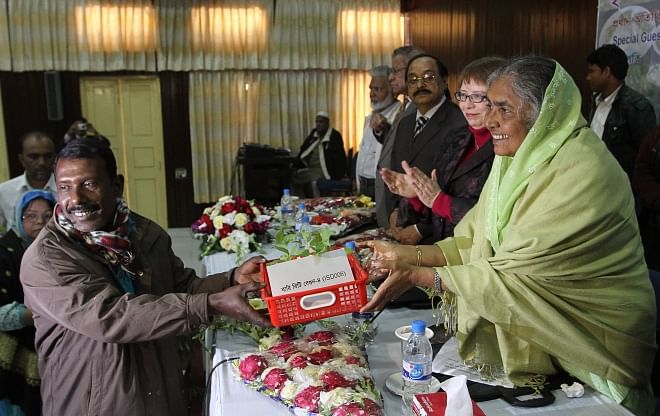Modified brinjal goes to farmers

The Bangladesh Agricultural Research Institute (Bari) has formally started distributing saplings of the country's first genetically modified (GM) crop Bt Brinjal among the farmers.
Agriculture Minister Matia Chowdhury yesterday distributed the saplings among 20 farmers from four regions at a programme at the Bangladesh Agricultural Research Council (Barc) in the capital.
Bangladesh has now joined a group of 29 countries that grows GM crops.
The National Committee on Biosafety (NCB) on October 30 last year gave approval to newly developed GM brinjal varieties -- BARI Bt Brinjal-1 (Uttara), BARI Bt Brinjal-2 (Kajla), BARI Bt Brinjal-3 (Nayontara) and BARI Bt Brinjal-4 (ISD006) after years of lab and field-level experimentation and also after clearing weeks of legal tangles. A number of green groups protested against such release in fear of losing crop biodiversity and farmers' rights on seeds. Breeders, however, dismissed such fears saying cultivation of Bt Brinjal would help farmers stay away from health hazards and save money spent, otherwise, on spraying pesticides. Besides, they say, farmers are free to save seeds from their products and there is no question of buying seeds of Bt Brinjal from companies every year.
A number of green groups protested against such release in fear of losing crop biodiversity and farmers' rights on seeds. Breeders, however, dismissed such fears saying cultivation of Bt Brinjal would help farmers stay away from health hazards and save money spent, otherwise, on spraying pesticides. Besides, they say, farmers are free to save seeds from their products and there is no question of buying seeds of Bt Brinjal from companies every year.
“We have decided to start cultivation of Bt Brinjal after conducting different necessary tests at home and abroad. We have taken a long time to experiment the pros and cons for introducing the cultivation of this variety,” said the minister while addressing the programme as the chief guest.
There was no alternative to accepting the reality of the GM crops to ensure food security, she said, adding that the government was always alert of any kind of negative reaction to public health and environment.
Matia further said just to protect brinjals from fruit and shoot borers (FSB), farmers spray pesticides up to 60 to 180 times a season, exposing the agro-ecological environment and the vegetable itself to serious threat. Bt Brinjal came as a remedy to that as it had got the built-in capacity to fight back FSB and would require no pesticides, she added.
Talking to The Daily Star yesterday, BARI Director General Dr Md Rafiqul Islam Mondal explained that 20 selected farmers would grow Bt Brinjal under their supervision on one bigha of land each and reap the crop expectedly in April this year.
The seeds of Bt Brinjal would be made available to all farmers in the country late this year, he added.
Ten farmers from four regions -- Gazipur, Jamalpur, Pabna and Rangpur -- while talking to The Daily Star have expressed their hope of producing better quality brinjal.
“Usually, I have to spend Tk 8,000 to Tk 10,000 for pesticides to produce the existing variety of brinjal. Even then it is difficult to check the attacks of fruit or shoot borers [FSB] in the field,” said Mojibur Rahman, a farmer from Gazipur.
He said he believed cultivation of the new variety would reduce his costs as well as labour.
Rahmat Ali from Pabna also said he expected to make much profit by avoiding spraying pesticides and applying other chemicals and fertilisers.
“Truly, if the new variety proves that it is pest-resistant and brings the costs down, I will be satisfied to continue with cultivating it and will also encourage our local farmers to use it,” he added.
Moksedul Alam, another farmer from Jamalpur, did not see any threat to environment or public health.
“As the government is giving us assurance of providing all-out support, we do not see any problem here,” he added.
Scientists of BARI engineered brinjal, one of the country's most consumed vegetables, by inserting a crystal protein gene (Cry1Ac) taken from the soil bacterium Bacillus thuringiensis, known as Bt, in 2005.
It took seven years to complete greenhouse as well as open-field trials of Bt Brinjal in various agro-ecological zones in the country. Bt gene insertion in brinjal makes it resistant to FSB that causes 50 to 70 percent loss of harvest.
The USAID mission director to Bangladesh, Janina Jaruzelski, former caretaker government adviser and also former agriculture secretary MM Shawkat Ali, Agriculture Secretary SM Nazmul Islam, BARI Director General Dr Md Rafiqul Islam Mondal, among others, spoke at the sapling distribution programme.

 For all latest news, follow The Daily Star's Google News channel.
For all latest news, follow The Daily Star's Google News channel. 




Comments